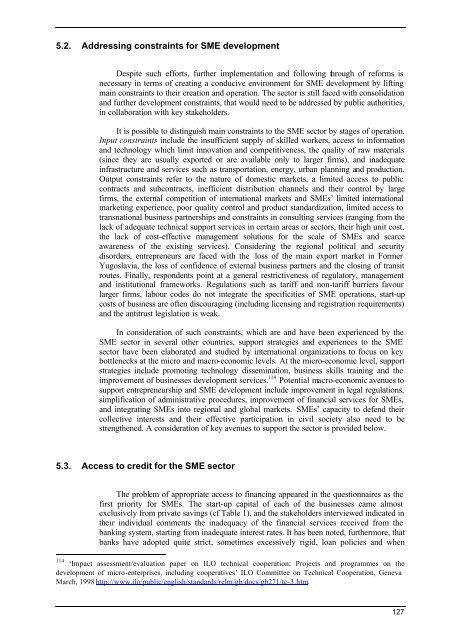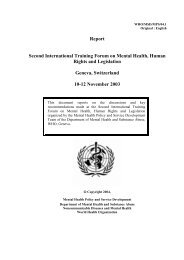5.1.3. The policy framework for the support of the SME sectorIn the context of the growing importance of SMEs in the economy, several strategicorientation and policy documents have been prepared and adopted by the Government tosupport and improve the environment of the SME sector, including: the Strategy forDevelopment of SME, the Law on Realisation of Handicraft activities, the National Policyfor Development of Technology, and the Program for Measures and Activities for Supportof Entrepreneurship and Creation of Competitiveness of SMEs in the Republic ofMacedonia. 111As far as the institutional environment, the National Council for Competitiveness andEntrepreneurship was established in 2003 to assist and provide guidance to theGovernment to improve the environment for entrepreneurship, specifically by workingthrough public-private partnerships. In July 2003, the ProBiznis Bank was established toprovide financial services to micro and small entrepreneurs. A law on the MacedonianGuarantee Fund and a law on an Agency for Entrepreneurship are currently underpreparation along this same effort of improving the institutional infrastructure for the SMEsector.The FYROM has also actively pursued collaboration with key internationalstakeholders in its private sector development policy, in particular with the European Bankfor Reconstruction and Development (EBRD). The EBRD has considerably intensified itssupport programme to the FYROM in the biennial strategy of mid-2002 through mid-2004with nine new loan commitments agreed for a total of 126 million EUR, representing a 62per cent increase of the total cumulative business volume to date. It is particularlyencouraging that three projects were signed with foreign sponsors, a tentative sign ofrenewed investors’ confidence after the 2001 conflict. The EBRD has supported the accessto credit segments by establishing a micro-finance bank which has already providedfinance for over 3,700 SMEs, and regional integration efforts through infrastructuredevelopment (e.g. roads and regional electricity interconnection). 112The Republic of Macedonia has demonstrated progress in accepting andimplementing the provisions from the European Charter for Small and Medium Enterprisesin the Western Balkans but further simplification and improved information on theregistration process, better information on regulations and standards to be respected bysmall companies, a new programme on enhancing business skills and introduction of anational guarantee fund are also expected, as stated in the report on the implementation ofthe European Charter for Small Enterprises. These will be quite welcome instruments. 113111 Investment Guide for Southeast Europe 2003, http://www.seeurope.net/en/pdf/Macedonia.pdf112 ‘FYR Macedonia Strategy Overview’, http://ebrd.com/about/strategy/country/mace/comment.pdf113 The Head of Delegation of the European Commission, Ambassador Donato Chiarini, presented to Minister ofEconomy Stevco Jakimovski the Commission report on the European Charter for Small Enterprises on theoccasion of the EU-Western Balkans summit in Thessaloniki in June 2003, the countries in this region endorsedthe European Charter for Small Enterprises.‘FYR Macedonia follows the recommendations of the European Charter for Small Enterprises’, Newsletter, ECDelegation- Skopje, May 2004, www.delmkd.cec.eu.int/en/information-sources/newsletters/2004-htm/newsletter-2004-05-2htm126
5.2. Addressing constraints for SME developmentDespite such efforts, further implementation and following through of reforms isnecessary in terms of creating a conducive environment for SME development by liftingmain constraints to their creation and operation. The sector is still faced with consolidationand further development constraints, that would need to be addressed by public authorities,in collaboration with key stakeholders.It is possible to distinguish main constraints to the SME sector by stages of operation.Input constraints include the insufficient supply of skilled workers, access to informationand technology which limit innovation and competitiveness, the quality of raw materials(since they are usually exported or are available only to larger firms), and inadequateinfrastructure and services such as transportation, energy, urban planning and production.Output constraints refer to the nature of domestic markets, a limited access to publiccontracts and subcontracts, inefficient distribution channels and their control by largefirms, the external competition of international markets and SMEs’ limited internationalmarketing experience, poor quality control and product standardization, limited access totransnational business partnerships and constraints in consulting services (ranging from thelack of adequate technical support services in certain areas or sectors, their high unit cost,the lack of cost-effective management solutions for the scale of SMEs and scarceawareness of the existing services). Considering the regional political and securitydisorders, entrepreneurs are faced with the loss of the main export market in FormerYugoslavia, the loss of confidence of external business partners and the closing of transitroutes. <strong>Final</strong>ly, respondents point at a general restrictiveness of regulatory, managementand institutional frameworks. Regulations such as tariff and non-tariff barriers favourlarger firms, labour codes do not integrate the specificities of SME operations, start-upcosts of business are often discouraging (including licensing and registration requirements)and the antitrust legislation is weak.In consideration of such constraints, which are and have been experienced by theSME sector in several other countries, support strategies and experiences to the SMEsector have been elaborated and studied by international organizations to focus on keybottlenecks at the micro and macro-economic levels. At the micro-economic level, supportstrategies include promoting technology dissemination, business skills training and theimprovement of businesses development services. 114 Potential macro-economic avenues tosupport entrepreneurship and SME development include improvement in legal regulations,simplification of administrative procedures, improvement of financial services for SMEs,and integrating SMEs into regional and global markets. SMEs’ capacity to defend theircollective interests and their effective participation in civil society also need to bestrengthened. A consideration of key avenues to support the sector is provided below.5.3. Access to credit for the SME sectorThe problem of appropriate access to financing appeared in the questionnaires as thefirst priority for SMEs. The start-up capital of each of the businesses came almostexclusively from private savings (cf Table 1), and the stakeholders interviewed indicated intheir individual comments the inadequacy of the financial services received from thebanking system, starting from inadequate interest rates. It has been noted, furthermore, thatbanks have adopted quite strict, sometimes excessively rigid, loan policies and when114 ‘Impact assessment/evaluation paper on ILO technical cooperation: Projects and programmes on thedevelopment of micro-enterprises, including cooperatives’ ILO Committee on Technical Cooperation, GenevaMarch, 1998 http://www.ilo/public/english/standards/relm/gb/docs/gb271/tc-3.htm.127
- Page 1 and 2:
HEI-ILO Research Programme onStreng
- Page 3:
PrefaceThis three-volume series res
- Page 7 and 8:
Table of contentsPreface...........
- Page 9:
The Private Sector and Social Partn
- Page 13:
Executive summaryPrivate enterprise
- Page 16 and 17:
IGOs, NGOs—tend to exclude, or at
- Page 18 and 19:
• The World Bank has created a kn
- Page 20 and 21:
2. Private enterprises in conflict-
- Page 22 and 23:
Figure 1: The Private Sector Employ
- Page 24 and 25:
2.3. Case study: Promoting multi-et
- Page 26 and 27:
downstream, i.e. refining and distr
- Page 28 and 29:
Box 1: How does Somalia’s private
- Page 30 and 31:
Sectoral aspectsthere will be added
- Page 32 and 33:
inequities in pricing. “Of the 16
- Page 34 and 35:
into the armies are thereby also at
- Page 36 and 37:
3. Private enterprises and social p
- Page 38 and 39:
Two natural disasters which have be
- Page 40 and 41:
Box 4: Cooperatives in crisis respo
- Page 42 and 43:
partners, the tripartite cooperatio
- Page 44:
36forces and that are able to perfo
- Page 48:
AcknowledgmentsThe authors of this
- Page 51 and 52:
6.2. Delimiters of women’s econom
- Page 54 and 55:
Executive summaryDespite the rich n
- Page 56 and 57:
1. IntroductionSince 1979, under th
- Page 58 and 59:
2. Country profileThe Republic of I
- Page 60 and 61:
• activities related to reconstru
- Page 62 and 63:
for university education concerning
- Page 64 and 65:
2.4. Economic environment assessmen
- Page 66 and 67:
Unemployment (15 years of age and a
- Page 68 and 69:
2.5. PerspectivesDespite devastatio
- Page 70 and 71:
3. The rationale of SME sector deve
- Page 72 and 73:
4. Iraq's SME sector: A profile4.1.
- Page 74 and 75:
The Private sector employment pyram
- Page 76 and 77:
Table 8: Estimates of total formal
- Page 78 and 79:
Feasibility study: almost all respo
- Page 80 and 81:
Table 9: Percentage of female entre
- Page 82 and 83:
Factors for public sector preferenc
- Page 84 and 85: The recessionary indication of busi
- Page 86 and 87: Special investment legislation and
- Page 88 and 89: 8. Small entrepreneurs in Iraq: Sto
- Page 90 and 91: a reasonable income and independenc
- Page 92 and 93: 9. RecommendationsSME-development s
- Page 94 and 95: Longer-term SME developmentBesides
- Page 96 and 97: • literature and artistic service
- Page 98 and 99: 2. List of interviews with governme
- Page 100 and 101: 11. Why did you decide establishing
- Page 102 and 103: 33. What are the cost components of
- Page 104 and 105: 59. Are you working on a project, o
- Page 106: Promoting multi-ethnic stakeholder
- Page 109 and 110: 101
- Page 111 and 112: 103
- Page 113 and 114: 105
- Page 115 and 116: 107
- Page 117 and 118: 109
- Page 119 and 120: Research methodologyThe research te
- Page 121 and 122: possibility of conflict. In 1992, a
- Page 123 and 124: 2.2.2. PovertyAfter the break-up of
- Page 125 and 126: of almost 10 per cent of GDP, yet i
- Page 127 and 128: Source of initial financing: privat
- Page 129 and 130: ‘It is important to point out tha
- Page 131 and 132: 4.2. The economic resilience of int
- Page 133: medium-sized companies employing 24
- Page 137 and 138: 5.4. Support to local initiativesSM
- Page 139 and 140: ConclusionConsidering the actual an
- Page 141 and 142: Scott, Norman: Macedonia: A Brief E
- Page 143 and 144: Official gross reserves 4 290 450 7
- Page 145 and 146: 4. Survey questionnaire1. Name of t
- Page 147 and 148: 139
- Page 149 and 150: 141
- Page 151 and 152: 143
- Page 153 and 154: 2. Le contexte2.1. Le paradoxe ango
- Page 155 and 156: Composition et description des Futu
- Page 157 and 158: Les généraux angolais sont prése
- Page 159 and 160: Les syndicats officielsL’Union na
- Page 161 and 162: Une étude réalisée en 2003 pour
- Page 163 and 164: 3.3. Sortir du cercle vicieux : vie
- Page 165 and 166: Annexes1. Morceaux choisis : le «
- Page 167 and 168: 159
- Page 169 and 170: L’implication des partenaires soc
- Page 171 and 172: Table des matièresTable des matiè
- Page 173 and 174: RemerciementsQu’il me soit permis
- Page 175 and 176: Liste des acronymesAFASPAALEANEAANS
- Page 177 and 178: GlossaireAide d’urgence :Aléa :A
- Page 179 and 180: Résumé exécutifAu cours des dix
- Page 181 and 182: 1. IntroductionLe département de R
- Page 183 and 184: Limites de l’étudeAvant de proc
- Page 185 and 186:
évalué à plus de deux milliards
- Page 187 and 188:
2.2.2. Aspects démographiquesLes p
- Page 189 and 190:
2.3.3. EducationDès l’indépenda
- Page 191 and 192:
création de fonds de stabilisation
- Page 193 and 194:
3. Analyse des formes de réponse :
- Page 195 and 196:
• le secteur de l’Eau sera dest
- Page 197 and 198:
• la révision de la législation
- Page 199 and 200:
de main-d’œuvre, encourageant la
- Page 201 and 202:
leur fournissait les équipements e
- Page 203 and 204:
matérielle sous des formes diverse
- Page 205 and 206:
centre de l’attention des partena
- Page 207 and 208:
• le rôle dévolu à la commissi
- Page 209 and 210:
Renforcer le rôle de solidarité d
- Page 211 and 212:
ConclusionLa dimension de la tache
- Page 213 and 214:
Equipe Multidisciplinaire pour l’
- Page 215 and 216:
2. Séries statistiquesTable 8 : Ev
- Page 217 and 218:
Table 11 : Répartition de la popul
- Page 219 and 220:
Table 2 : Liste détaillée des com
- Page 221 and 222:
Table 4 : Dispositif d’interventi
- Page 223 and 224:
Organisation de l’unité syndical
- Page 225 and 226:
- Centre technique de construction.
- Page 227:
219














